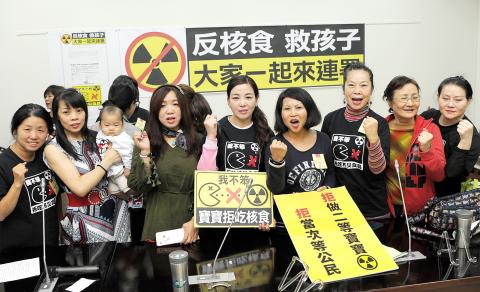Chinese Nationalist Party (KMT) Vice Chairman Hau Lung-bin (郝龍斌) yesterday called for a referendum on easing a food import ban from five Japanese prefectures to “stop the addle-brained government,” as the KMT caucus announced plans to launch a nationwide petition to exert further pressure on the Democratic Progressive Party (DPP) administration.
“On Tuesday, Japan’s Interchange Association Chairman Mitsuo Ohashi criticized Taiwan’s concerns about potentially radiation-contaminated Japanese food products as ‘unsubstantiated comments’ and called on President Tsai Ing-wen’s (蔡英文) government to lift the import ban,” Hau said on Facebook.
The DPP’s attempts to “sacrifice public food safety in exchange for diplomatic relations” in the past six months have galvanized disputes and public unrest, Hau said, adding he regrets that the Tsai administration has chosen to act against public opinion.

Photo: CNA
Hau said that when a government is turning a blind eye and a deaf ear to people’s opposition and anger, the only remaining option is to resort to direct democracy and check and balance the DPP’s legislative majority via a referendum.
“Despite the high threshold for passing referendums, this is people’s last resort to stopping an addle-brained government,” he added.
Given that all six referendums held since the 2003 promulgation of the Referendum Act (公民投票法) were initiated by political parties and centered on political issues, a plebiscite on the import ban would be a true realization of giving people a direct say in public affairs, Hau said.
Hau’s office said the proposed referendum would not be initiated by the party, but rather through cooperation with civic groups.
According to the act, a referendum proposal requires signatures from no less than 0.5 percent of the total number of voters in the latest presidential election. After the proposal is reviewed, the second stage is to gather signatures from 5 percent of voters for a referendum to be set up.
A 50 percent turnout of eligible voters is also required for a referendum to be declared legitimate.
Hau made the remarks amid reports that the government is mulling lifting the ban it imposed on food products from Fukushima, Ibaraki, Tochigi, Gunma and Chiba prefectures in March 2011.
KMT Culture and Communications Committee deputy director Tang Te-ming (唐德明), in response to media inquiries about Hau’s plan, said that the party is campaigning nationwide with a signature drive, but a referendum is the public’s right, so it would be a good way to express public discontent.
Separately yesterday, the KMT caucus held a news conference at the legislature to announce its plan to initiate a nationwide petition on Sunday to deter the government from relaxing the import ban.
“We have repeatedly stressed the importance of food safety. The KMT caucus’ stance is to safeguard public health, given that our government has played dumb and acted against the people. We must resort to direct public opinion,” KMT caucus Secretary-General Johnny Chiang (江啟臣) said.
Chiang welcomed efforts by civic groups proposing a referendum.
Additional Reporting by Shih Hsiao-kuang

Taiwan is stepping up plans to create self-sufficient supply chains for combat drones and increase foreign orders from the US to counter China’s numerical superiority, a defense official said on Saturday. Commenting on condition of anonymity, the official said the nation’s armed forces are in agreement with US Admiral Samuel Paparo’s assessment that Taiwan’s military must be prepared to turn the nation’s waters into a “hellscape” for the Chinese People’s Liberation Army (PLA). Paparo, the commander of the US Indo-Pacific Command, reiterated the concept during a Congressional hearing in Washington on Wednesday. He first coined the term in a security conference last

Prosecutors today declined to say who was questioned regarding alleged forgery on petitions to recall Democratic Progressive Party (DPP) legislators, after Chinese-language media earlier reported that members of the Chinese Nationalist Party (KMT) Youth League were brought in for questioning. The Ministry of Justice Investigation Bureau confirmed that two people had been questioned, but did not disclose any further information about the ongoing investigation. KMT Youth League members Lee Hsiao-liang (李孝亮) and Liu Szu-yin (劉思吟) — who are leading the effort to recall DPP caucus chief executive Rosalia Wu (吳思瑤) and Legislator Wu Pei-yi (吳沛憶) — both posted on Facebook saying: “I

Sung Chien-liang (宋建樑), who led efforts to recall Democratic Progressive Party (DPP) Legislator Lee Kun-cheng (李坤城), was released on bail of NT$80,000 today amid outcry over his decision to wear a Nazi armband to questioning the night before. Sung arrived at the New Taipei District Prosecutors’ Office for questioning in a recall petition forgery case last night wearing a red armband bearing a swastika, carrying a copy of Adolf Hitler’s Mein Kampf and giving a Nazi salute. Sung left the building at 1:15am without the armband and covering the book with his coat. Lee said today that this is a serious

A mountain blaze that broke out yesterday morning in Yangmingshan National Park was put out after five hours, following multi agency efforts involving dozens of fire trucks and helicopter water drops. The fire might have been sparked by an air quality sensor operated by the National Center for High-Performance Computing, one of the national-level laboratories under the National Applied Research Laboratories, Yangmingshan National Park Headquarters said. The Taipei City Fire Department said the fire, which broke out at about 11am yesterday near the mountainous Xiaoyoukeng (小油坑) Recreation Area was extinguished at 4:32pm. It had initially dispatched 72 personnel in four command vehicles, 16